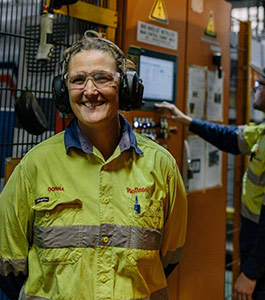
To ensure optimal performance, retention, and engagement of your team, it is important to understand and cater to the different needs of different groups of employees.
While all apprentices will enter their roles with a certain level of inexperience in a trade, strategies to support and empower mature age apprentices differ from that of school-aged apprentices. A mature-aged apprentice is someone who begins an apprenticeship at 21 years of age or older. Whether they are changing career paths or finally pursuing a long-term passion, mature aged apprentices are highly likely to find job satisfaction through career development and learning opportunities. Due to their maturity, these apprentices will have a greater appreciation for the facilitation of career pathways and progression, as they afford an opportunity to increase their knowledge and skillsets while being in an entry-level role.
A recent survey by LinkedIn highlighted that the majority (57%) of business leaders emphasised that soft skills including leadership, communication, collaboration, and time management are the preferred skills for employee development. Providing mature aged apprentices opportunities to foster such skills is one way of contributing to their sense of job control, progress, and job satisfaction. It validates their desires to develop personally and professionally beyond the basic skills required for their roles and showcases that the organisation values and supports the success and growth of their staff, both now and in the long term.
Accommodating such learning opportunities is one strategy that contributes to the retention of the apprentices that an organisation will have invested considerable time, money, and energy into developing. The fact that mature aged apprentices have chosen a trades profession later in life often means that they have a higher level of commitment. It is in an organisation’s best interests to ensure that this is nurtured as much as possible, not only ensure that the apprentice is retained, but that
they reach the highest level of potential. The Australian Institute of Management (AIM) revealed that 46 percent of people in the country are looking to switch jobs, a major contributor to this being a lack of job satisfaction which can lead to poor mental health and wellbeing in the workplace.
Investing time and resources into training and developmental opportunities for your mature aged apprentices is a mutually beneficial way to increase your employee’s skill sets and improve the mental health and wellbeing of staff, while ensuring that apprentices are retained once qualified.
References:
Biro, M., Developing your employees is the key to retention – here are 4 smart ways to start, Forbes,
<https://www.forbes.com/sites/meghanbiro/2018/07/23/developing-your-employees-is-the-key-toretention-
here-are-4-smart-ways-to-start/?sh=15398b453734>, 23 July 2018, accessed 25 October
2021.
Blazevik, O., Mature Age Apprentices: are they worth it?, Training.com.au,
<https://www.training.com.au/ed/mature-age-apprenticeships-worth/>, 9 January 2019, accessed
25 October 2021.
Indeed Editorial Team, Mature age apprenticeships: everything you need to know, Indeed,
<https://au.indeed.com/career-advice/finding-a-job/mature-age-apprenticeships>, 21 September
2021, accessed 25 October 2021.




